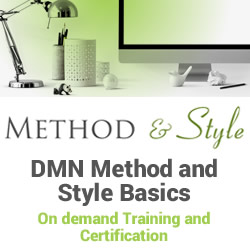Predicting the Customer Experience: A Convergence of Business Process, Decision Making, and Analytics
Transcript
Predicting the Customer Experience:
A Convergence of Business Process,
Decision Making, and Analytics
Chief Architect for some of Largest BPM Systems in the World,
with Projects Exceeding $200 Million in Total Scope and Investment
Co-author of 12 books on BPM including the “BPMN 2.0 Handbook”
and “Mastering the Unpredictable” which reached #2
on the Amazon.com Bestsellers List for IT
Was named #1 on the 2011‘Influencer 50’ list ranking
the most influential people in the field of BPM
Executive Director of the Workflow Management Coalition,
the definitive business process association since 1993
Has played active roles in relevant standards and
consortia including OMG, OASIS and AIIM
The first recipient of the Laureate in Workflow award,
a distinction held by select industry leaders worldwide
About Nathaniel Palmer
“. . .a discipline involving any combination of
modeling, automation, execution, control,
measurement and optimization of business activity
flows, in support of enterprise goals, spanning
systems, employees, customers and partners
within and beyond the enterprise boundaries.”
What is BPM?
Driving Compliance and Scalability by
Automating Predefined Workflows
BPM Processes Are Deterministic,
Where All Possible Paths Are
Pre-Determined or Known in
Advance, No Matter How Complex
the Pathways May Be.
The Direction of the Process is
Determined by the Pre-Defined Path
and Current State; State is Determined
by the Preceding Activity.
BPM enables a transactional thread
from application-to-application,
activity-to-activity.
Phase One of BPM. . .
Cross-Application Integration
Managing Screen-Flows
Abstracting Business Logic
Enabling Business Control of Business Processes
Delivering a Transactional Thread
Across Systems
BPM in the First Wave
(Where Most Still Are Today)
The 2nd Major Revolution in IT Architecture
1970 20201995
40 Years of
Application-centric
Data Architectures
Extraction & Transformation
Client/Server Architecture
Transaction Processing
Data Synchronization
2013
Cloud Architecture
Predictive Analytics
Semantic Integration
Mobile, Social, Cloud
Process of Everything
The Relational Era
The Big Data Era
To Data-Driven
Applications
Shift to “Intelligent BPM” and “Smart Processes” . . .
Leveraging Rules / Policies, Goals and Intelligent Agents
More Agile Execution Models Allows for Adapting to Meet
Goals, Rather Than Sticking Strictly to Predefined Paths
“Data-Driven” = Shift to Information-Intensive,
Adaptable Processes Driven by Analytics, Context,
and External Events
BPM Evolves to Address New Realities
of Digital Business
BPM + ODM: Customer-centric Processes
are Data-Driven and Unpredictable
A Library of Process Fragments Can
Be Called on to Automate Mundane
Tasks or Regulated Processes
An Event Occurs
Which Launches a
New Process / Case
The Case is
Completed
When Criteria
is Met
Analytics Help
Define How the
Case is Processed
“Intelligent Capture”
Information is Captured
and Added to the Case
Prepare Document Process Application
Business Rules, Policies
and Processes Are Run
Against Case Data
Ensuring continuity across multiple
channels, including mobile devices
with inconsistent connectivity
Business
Value
Time
Data
Latency
Analysis
Latency
Decision
Latency
Infrastructure
Latency
Business-relevant Event Occurs
Event Data Captured
Analysis Delivered
Action Taken
Value Available
Through Earlier
Notification
Value Available
From Faster
Decisions
Adapted from Hackathorn, R. (2002); zur Muehlen, M (2010)
Why you want to act sooner, not just faster.
Business
Value
Time
Move to the point of
action to here. . .
…from here.
Leverage BPM and ODM to shift the point to
which business events become actionable.
Why you want to act sooner not just faster.
Capturing Context & Meaning From Events
Event Processing
Event Detection
& Correlation
Knowledgebase
Event Log & Patterns
Reporting
Dashboards
Alerts and Actions
Predictive Analytics
Simulation
Data mining
Event Tagging
Event Cloud
Legacy
New
Apps
Transactional Systems
Document Capture &
Content Management
SOA Middleware as Event Delivery Pipe
Social Media/Networks Mobile Devices
Actionable Analytics Framework
Intimacy
Expediency
Now
Then
Whether or Not You have a Strategy
Does Change Your Customers’ Expectations.
Meet Your Customers
for the Next 20 Years
Are you ready?
Meet Your Customers
for the Next 20 Years
“60% of smartphone or tablet owners who switched primary
banks in the fourth quarter said that mobile banking capabilities
were an “important” or “extremely important” component in their
decision to switch, versus only 48% surveyed 6 months earlier.”
Source: Mobile Financial Services Tracking Study,” AlixPartners, March 2014
“60% of smartphone or tablet owners who switched primary
banks in the fourth quarter said that mobile banking capabilities
were an “important” or “extremely important” component in their
decision to switch, versus only 48% surveyed 6 months earlier.”
Source: Mobile Financial Services Tracking Study,” AlixPartners, March 2014
But Does Your
Mobile Strategy
Look Like This?
The App is Not Your
Mobile Strategy,
it is the Process!
What’s Next?
What’s Next?
The home office receives the
application electronically,
underwrites the policy and
electronically issues and
sends the policy to FA.
“Intelligent Capture”
Questions answered, the application is
completed and signed electronically
on the tablet. The client writes a
check to bind the application and the
FA uses the tablet to take a picture of
the check to bind the application.
A Financial Advisor (FA)
conducts client annual
review – determines
client needs additional
life insurance.
The FA can choose to print
the policy or send an
electronic copy securely
to the client.
1
4
The FA hits the
“Mayday” button
and spawns a live
video chat with an
underwriter.
5
6
6
Leveraging BPM and ODM for an
Optimal Customer Experience and Real-Time
Response: Financial Advisor Scenario
3
2
FA brings up an
insurance
application on
tablet and fills
out with the
client.
How Will You Deliver a
Predictable (and Optimal)
Customer Experience in the post-
relational, post-PC, Internet of
Everything digital marketplace?
Don’t Do Radio on TV: Process Should Drive Your Mobile
Strategy and Your Customer Engagement Strategy
Meaningful Transparency of Business Operations Requires
Gaining Visibility Beyond Core Business Systems, Into the
Edge-points of Customer Interaction
Focus on the Ability to Measure Performance and
Progress in Holistically, Across the Entire Customer
Experience Lifecycle
BPM and ODM Going Forward:
Strategy Take-Aways
Industry Shift From Efficiency to Effectiveness
It’s No Longer (just) About Saving Money, Today
It’s About Making Money
Focus on Response Time and Customer Experience
Success Metrics and Performance Objectives are
Increasingly Revenue-Focused not Cost-Driven
The App is Not Your Mobile Strategy, it is the Process!
BPM and ODM Going Forward:
The Next 12 Months and Beyond
Your Strategy. . .
Develop a “Metrics Culture” Across
Your Organization (not just your own team)
• Know When and How Success Will be Measured
• Show Results Frequently and On Time
• Formalize Your Own Customer Experience
Maturity Model (pick one, define one, but use it)
Your Strategy. . .
Sell Your Program on Growth vs Cost
• Know Your Metrics and Make Them Visible
• Target Growth Areas With Momentum
• Engage Customers Throughout – Directly
and Through Stakeholders
Your Strategy. . .
Scale Your Team With the Program
• Start With Cross-Functional Team / Skillset
• Release Often – Results < 90 Days
• Create a Feedback Look for:
Target -> Results -> Review -> Redeploy
•Get Started!
As a starting point, avoidprocesses that:
√ are already well-defined,
√ are overly complex, or
√ are politically charged.
Look for opportunities and processes that are characterized as:
√ paper-intensive, involving tasks done on a frequent basis (daily),
√ lacking a rigid or controversial definition, and
√ having an immediate and measurably positive impact on
customers, stakeholders and/or end users.
Getting Started With BPM:
Picking the Right Targets
Complex
Tactical StrategicAlignment With Business Goals
SimpleDegreeofDifficulty
Limited Value,
Low Visibility
Likely
Target Area
High Value,
High Risk
Getting Started With BPM:
Picking the Right Targets
How Will This Improve The Customer’s Experience?
Who Benefits From The New Process or System?
What Metrics Provide the Best Measurement of Success?
Are the Terms (Vocabulary) Consistent and Mutually Understood?
Will the Users of the Process Measure Success the Same as
Other Stakeholders and/or Sponsors?
How Do We Engage Our Customers’ Perspective in the
Understanding and Definition of the Business Process?
Getting Started With BPM:
Picking the Right Targets
Contact Info:
Nathaniel Palmer
nathaniel@bpm.com
+1 (781) 534-3868 mobile
twitter.com/nathanielpalmer
www.linkedin.com/in/bigdatasmartprocess/
Leave a Comment
You must be logged in to post a comment.







